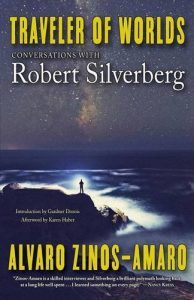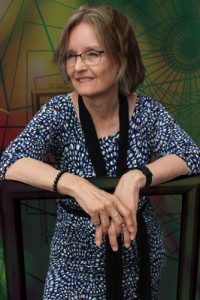John Crowley: End of An Age

John Crowley was born in Presque Isle, Maine, where his father, a doctor and captain in the Army Air Corps, was stationed. The family settled in Indiana and Crowley attended Indiana University, earning a degree in English.
Crowley writes SF, fantasy, and mainstream literary work, often blurring genre distinctions. His first three novels were (mostly) SF: The Deep (1975), Beasts (1976), and Engine Summer (1979). He turned to literary fantasy with Little, Big (1981), winner of a World Fantasy Award and perhaps his best known work, called “a neglected masterpiece” by critic Harold Bloom.
He embarked on his hugely ambitious Ægypt series with Ægypt (1987), followed by Love & Sleep (1994), Daemonomania (2000), and Endless Things (2007).
Other novels include mainstream work The Translator (2002) and ambitious historical Lord Byron’s Novel: The Evening Land (2005), which includes a fictional novel by the poet. His latest novel, Four Freedoms (2008), is also historical, set in an American aircraft factory during World War II.
Crowley’s short fiction is also celebrated, including “Novelty” (1983), “Snow” (1985), World Fantasy Award winner “Great Work of Time” (1989), and Locus Award winner “Gone” (1996). His short work has been collected in the World Fantasy Award-winner Novelty (1989), plus Antiquities (1993) and Novelties & Souvenirs (2004). Some of his non-fiction was gathered as In Other Words (2007). His work was the subject of critical study Snake’s-Hands: The Fiction of John Crowley, edited by Alice K. Turner & Michael Andre-Driussi (2003).
He also writes scripts for educational films and documentaries, and co-founded Straight Ahead Pictures with his wife in 1989 to produce film, video, radio, and online media.
Crowley’s numerous awards include an American Academy and Institute of Arts and Letters Award in Literature (1992) and a World Fantasy Life Achievement Award (2006).
Excerpts from the interview:
“It’s very hard living at the end of the Age of Print. It poses problems for all of us. It gets more and more discouraging, in some ways. Are we going to be saved by the ten thousand people all over the world who want and need our particular kind of book? Or do we have to forget about all that, write it on stones, and leave it lying around on the beach? Try to sell a book: it’s not easy today. It seems like the cost of printing books has gone down, so this should be a golden age of storytelling and a golden age of book production, yet I feel like I’m not going to be able to make a living doing this.
“As one gets older, fewer things change for us — or things change more slowly, if we’re lucky. When we last talked in 2001 I had finished the fourth volume of the Ægypt books (though it took a long time to get to press). I thought that was the last, but now I hope some foundation or somebody will help me to write the fifth volume, which will consist of a learned commentary on the entire four-volume series. I want to do it myself, because no fan, no critic is going to get it right. Though it’s sort of like explaining a joke, I would like to explain all the cool little things that are hard for readers to get or notice.
“I’ve never really had an editor. I’ve never had somebody say, ‘John, you’ve just gone too far. This is stupid! Take this part out, write another page explaining this, and that will allow you to cut the next 30 pages.’ Nobody has ever done that with any of my books. I wish they would. Very few editors do that anymore. In my experience, editors acquire books but they don’t actually alter them. Though in the case of Lord Byron’s Novel, I did use suggestions from both my editor Jennifer Brehl and my agent Ralph Vicinanza, for ways of giving background on Byron and having Ada find the manuscript — neither of those are my original conception, and I was very happy with those. So I guess that counts as an editorial contribution. I’m always open to suggestions. I’m not like Nabokov, where every editorial suggestion would be marked by an angry ‘STET!’ in the margin.”
*
“I attempted to give Four Freedoms a documentary feel, but a lot of it’s made up — more than it might seem. All historical novels insert a guy who’s made up into interaction with people who really did exist. The real Ludwig Wittgenstein studied engineering, flew kites, and designed a patented propeller, all that’s true — but he didn’t sell his patent to my entrepreneur character Henry Van Damme, because my character’s made up! (But the many suicides in the early history of flight recounted in the book are true.)
“All that stuff about early flight doesn’t have to be in the book, but I just loved it. I had decided that the airplane pioneers in my book would be brothers, and then I discovered how many real pairs of brothers were involved in the early history of flight: the Wright Brothers, the Montgolfier Brothers, all these pairs of brothers! What is that about? What it seems to be is one brother has an idea and the courage to actually fly these crazy, suicidal machines, and you need the other one to do the calculations and the math and say, ‘No, no, no, not yet!’
“At the end, a way of understanding the novel is presented to the smart reader, the careful reader, that I hope will resonate back through the whole book and cause it to be seen as a real American fantasy. The only places in my America that are named are Ponca City, Oklahoma, and San Francisco. You may have felt Chicago, or San Diego, but Chicago and San Diego aren’t named. And yes, I did that on purpose. I guess I was trying to make it all-American, without being tied down to any single part of America.”
*
“To actually articulate a way of being in a literary world without boundaries between reality and fantasy – it can’t just be a bunch of craziness and surreal carrying on, like some writers in the ’70s were doing. What is done in the writing has to be understood by the standard structures of what counts as a moving and live piece of fiction. It has to do the work of fiction no matter what may be going on, and not, ‘Well, we’re going to throw away the rules.’ Every 25 or 30 years, people attempt to do that, throw away the rules, and it keeps on not working. Gertrude Stein did it, Finnegans Wake does it, and they keep on having no progeny. Fantasy fiction at bottom, or at its best, is about making true fictions by the rules, in worlds you make up out of whole cloth, or out of your heart.”
This review and more like it in the January 2010 issue of Locus.
 While you are here, please take a moment to support Locus with a one-time or recurring donation. We rely on reader donations to keep the magazine and site going, and would like to keep the site paywall free, but WE NEED YOUR FINANCIAL SUPPORT to continue quality coverage of the science fiction and fantasy field.
While you are here, please take a moment to support Locus with a one-time or recurring donation. We rely on reader donations to keep the magazine and site going, and would like to keep the site paywall free, but WE NEED YOUR FINANCIAL SUPPORT to continue quality coverage of the science fiction and fantasy field.






